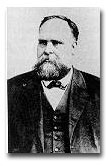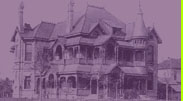GREAT CITIZENS - GOVERNOR JAMES STEPHEN (JIM) HOGG
 Governor James Stephen (Jim) Hogg, in whose 1892 reelection bid House wielded considerable influence, was the first native-born governor of Texas, serving as the nineteenth governor of the state from 1891-1895. Hogg was born on March 24, 1851 near Rusk in Cherokee County, one of five children of Lucanda and Joseph Louis Hogg, an attorney and brigadier general in the army. His formal education was limited; he attended a private school for a short time and was tutored at home until the advent of the Civil War. In 1862, when Hogg was eleven years old, his father died and his mother died in the following year. Hogg, his two brothers and two sisters had to attend to the family plantation.
Governor James Stephen (Jim) Hogg, in whose 1892 reelection bid House wielded considerable influence, was the first native-born governor of Texas, serving as the nineteenth governor of the state from 1891-1895. Hogg was born on March 24, 1851 near Rusk in Cherokee County, one of five children of Lucanda and Joseph Louis Hogg, an attorney and brigadier general in the army. His formal education was limited; he attended a private school for a short time and was tutored at home until the advent of the Civil War. In 1862, when Hogg was eleven years old, his father died and his mother died in the following year. Hogg, his two brothers and two sisters had to attend to the family plantation.
In 1866, Hogg attended school in Alabama. Upon his return to Texas, he began working with Andrew Jackson's newspaper in Cherokee County, while continuing his self-education. The family estate was soon sold to pay taxes and Hogg went to work for the local sheriff. Incurring the ire of outlaws, he was followed over the Cherokee County line and shot in the back. He soon recovered, however, and from 1871 to 1873 worked at various newspapers in East Texas. In 1873, he became a justice of the peace in Quitman, Wood County. Two years later he received his license to practice law and married Sarah Ann (Sallie) Stinson.
In 1876, Hogg suffered his only defeat in running for an elective office in Texas at the hands of state legislator John Griffith. Two years later, Hogg was elected county attorney in Wood County. Between 1880 and 1884, when he began the private practice of law in Tyler, he served as district attorney in the old seventh district, earning a reputation as the most aggressive and successful district attorney in the state. In that office he became the first Texas Democrat to win the black vote. In 1886, Hogg was elected as Democratic Attorney General of Texas, and served from 1887 to 1891, during the two terms of Governor L.S. Ross. He supported new legislation benefiting public schools and enforced laws regulating monopolies, especially railroads. He was known as a proponent of the free market system and he helped write the second state antitrust law to protect the public from monopolistic interests.
Hogg also supported the establishment of a Railroad Commission. With a platform emphasizing anti-monopoly legislation, Hogg was elected governor of Texas was established. Other legislation supported by the reform governor included the passage of the alien land law, intended to limit ownership of land by foreign corporations to the benefit of Texans.
Hogg's reelection bid of 1892 was hotly contested. Since his policies aroused bitter opposition as well as strong support Texans reelected him by a narrow margin over his closest opponent, fellow Democrat George W. Clark. The margin was 55,000 votes. In his second term, Hogg continued to support public schools at both lower and higher levels of education and personally labored to attract investment capital to Texas from the East Coast. After his second term expired in 1895, and the death of his wife later the same year, Hogg returned to private law practice.
In debt when he left office, Hogg proceeded to build his Austin law practice and invest in land. He also continued to promote reforms in Texas and at several public appearances at the turn of the century, proposed the prohibition of free paths for railroads and public funds for lobbyists. "Let us have Texas," he said, "the empire state, governed by the people...."
With James Swayne and three others, Hogg formed the Hogg-Swayne Syndicate, which purchased 15 acres of land near Beaumont in the Spindletop oil field. Later, the syndicate merged with the Texas Fuel Company, headed by J.S. Cullinan, to form the Texas Company, which became Texaco, Inc.
Following his return from a trip to England, Hogg left his law practice in Austin and moved to Houston, where he joined in the law firm Hogg, Watkins and Jones. Injured in a rail accident, Hogg retired to the Varner-Hogg Plantation north of West Columbia in Brazoria County--a plantation begun in 1824 by Martin Varner, one of Stephen F. Austin's "Old Three Hundred" colonists. In 1918, oil was discovered on the estate.
Hogg held modern political views. He supported legislation granting easy access to public records for all, as well as the elimination of insolvent Texas companies, and laws against corruption in general.
Hogg died on March 3, 1906 shortly before he reached his fifty-fourth birthday. His interest in public welfare was instilled in his children. Jim Hogg County in South Texas, created in 1913, was named in his honor. In addition, two state historical parks were dedicated as memorials to him: the 177-acre Jim Hogg State Park in Cherokee County, donated by the City of Rusk in 1941, and the 26-acre Governor Hogg State Park in Wood County. An historical site, the Governor Hogg State Park contains a museum housing items that belonged to him.






